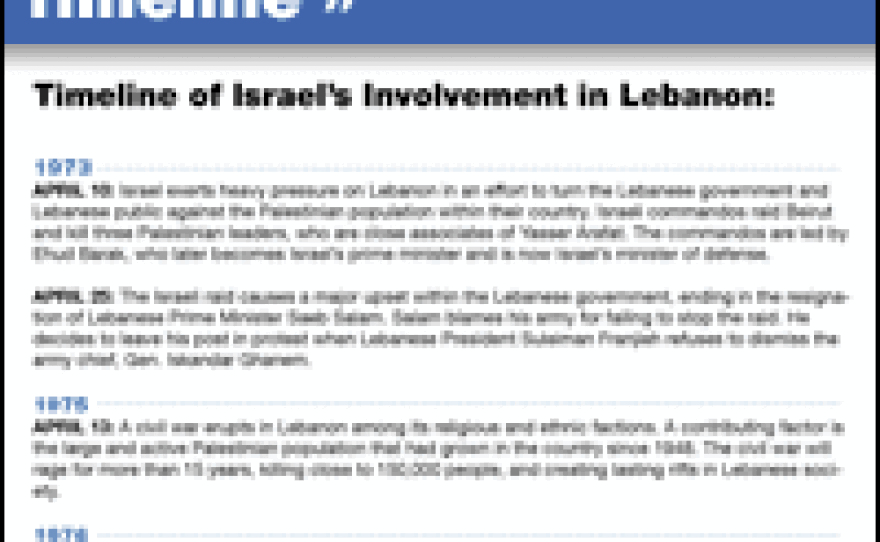Lebanon's government declared Wednesday a national holiday in celebration of a prisoner swap with Israel. But the Shiite militant group Hezbollah went one step further, plastering the highway with banners — from Beirut to the Lebanese border with Israel — proclaiming the exchange a "Divine Victory."
Hezbollah organized elaborate ceremonies to celebrate the return of five Lebanese prisoners and the bodies of nearly 200 Lebanese and Palestinian militants killed during decades of conflict with Israel. In return, Israel received the bodies of two of its soldiers.
In southern Lebanon, near the border with Israel, Hezbollah erected a pavilion festooned with yellow Hezbollah flags and a banner with the slogan "Pain in Israel, Joy in Lebanon" printed in English.
Hezbollah guerrillas on horseback rode up and down a red carpet as a military band played anthems dedicated to the group's commandos.
In the afternoon, a truck decorated with flowers passed by, carrying eight coffins decorated with Lebanese flags and four coffins covered with Palestinian flags. Israel returned the bodies of almost 200 Lebanese fighters.
"We are proud of what's happening today," said Zeyneb Hussain Deybis, a Lebanese woman and Hezbollah supporter.
Deybis brought her 10-year-old niece Fatimah, who lives in Germany, to the border to welcome the prisoners home.
"I want her to see that the prisoners were freed from Israeli jails and from the torture they were going through," Deybis said. "Samir Kantar is a hero because he defended Lebanon. I don't believe he meant to kill those people."
Kantar was convicted of the 1979 murder of two Israeli men and a 4-year-old Israeli girl, though he still denies killing the child.
Lebanese political scientist Amal Saad-Ghorayeb says that during his three decades in prison, Kantar became a cause for controversy for Hezbollah, even though the Shiite movement was created years after Kantar's capture.
"The symbolic value of his release can't be overstated for Hezbollah," Ghorayeb says. "They've been campaigning for his release for years now. In fact, the abductions on July 12, 2006, were code named by Hezbollah 'Operation Truthful Promise,' meaning a promise to release Kantar and others."
Hezbollah launched an unsuccessful cross-border raid in July 2006 to free Kantar — which resulted in the capture of two Israeli soldiers.
That raid triggered a vicious five-week war with Israel. The bodies of the two Israeli soldiers who were captured were returned to Israel on Wednesday. Hezbollah has not explained how the two soldiers died, though there is speculation they were mortally wounded during the raid.
Paul Salem, of the Carnegie Middle East Center in Beirut, says Israel's handover of Lebanese prisoners and the bodies of nearly 200 Lebanese and Palestinian fighters will give Hezbollah an important boost.
"So this brings it back onto the wider Arab and Muslim stage as a hero of Arab causes and Islamic causes and as a humiliator of Israel," Ghorayeb says.
After hours of waiting at the Lebanese border on Wednesday, a Hezbollah official announced what he said were "Lebanon's knights of freedom."
Officials embraced Kantar and the four Hezbollah fighters when they stepped onto a red carpet dressed in green camouflage fatigues. All five were captured during the war in July 2006.
The party continued — after a short helicopter ride up the coast to Beirut Airport — where the five men were greeted by Lebanon's new president, Michel Suleiman.
Suleiman said Lebanon's joy would be complete only when Israel hands over the disputed territory known as Shebaa Farms.
Kantar, meanwhile, made his first public comments in a brief statement to Lebanese television cameras.
"I am returning to the capital of the resistance," Kantar said, referring to Hezbollah's armed wing.
Later in the night, Kantar and the other four Lebanese prisoners were whisked off to celebrate their release on stage before a crowd of thousands of cheering people in Beirut's Shiite suburbs.
Seconds later, the leader of Hezbollah, Sheikh Hassan Nasrallah, made a surprise appearance on stage, embracing each of the five former prisoners in turn.
Nasrallah then addressed the crowd, saying, "The days of defeat are over, the days of victory have begun."
Copyright 2022 NPR. To see more, visit https://www.npr.org. 9(MDAzMjM2NDYzMDEyMzc1Njk5NjAxNzY3OQ001))







